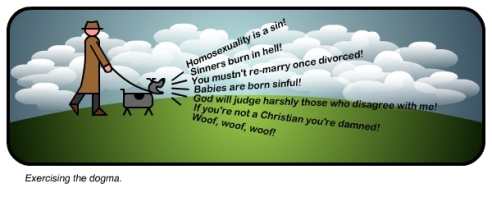While checking through my google reader I spotted a question that has stayed with me. Has the church in Australia (in particular that part of the body that would identify itself with the ’emerging church’ ) strayed too far from orthodoxy in favour of orthopraxis? I think how we answer this question is significant. My first thought is to query whether or not we need to have one or the other – are they mutually exclusive? Can we think wrongly but act rightly? Can we think rightly but act wrongly? I wonder if it is a false dichotomy. Jesus both challenged and supported the orthodoxy of his time, in both how he taught and what he did. He taught as much by what he did as by what he said. In some ways, I think his actions spoke more plainly than his words. Do ours?
Historically much energy has gone into defending doctrine. As Christians we can find ourselves busy with words defining the particulars of our faith. I think we need to continue to delve into what we believe and why, wrestle with the greys and be honest enough to admit our struggles philosophically and theologically. I also find this process rather fun. But orthodoxy is often a source of division – the foundation for attacking each other, marginalising those who think differently within and without the church. Christianity that never moves from that head space does not transform or bring life. I think our culture has had enough of that presentation of “Christianity”. If as followers of Jesus we put at least as much emphasis on what we do and how we are as we do on what we think and believe, I believe that our “Christ-ianity” will be far more alive for us and for those with whom we relate. There are fewer shades of grey when we care for the poor, when we love our neighbours, when we eat and drink together, when we stand up for those who are defenseless.
The challenge for the Australian church is not how to stand on the gay issue, it is not whether or not to play Hillsong or stand in arty candle lit huddles. Moving to a cafe, adopting seeker sensitive services or becoming technological Sunday wonders is not going to cut it either. It comes down to honestly grappling with what it means to follow Jesus. Sure, that has something to do with what we think and believe, but a whole lot more to do what flows out of us in our everyday living, our work and play, caring, loving. That is our gift of worship. That is our participation in the coming of the Kingdom.
This post is part of the synchroblog which a number of Australian Christians are participating in to celebrate Australia Day. For more on Christianity In Australia, see:


